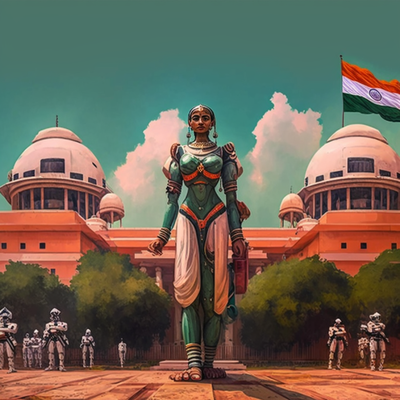Transforming Indian Judiciary with GPT4
3AI April 26, 2023

Featured Article:
Author: Vivek Gupta, Founder & CEO, Softsensor.ai
Indian judiciary suffers significant backlog with 35 million cases across many courts. Assuming that each case requires about 100 pages of drafting, we are looking at about 3.5 billion pages to be drafted. Each page takes about 30 mins, we are looking at 100 billion minutes to complete these cases. The work required to overcome this workload is humongous and can never be overcome. My own personal experience with NIC in district courts of Sirohi in Rajasthan had shown me the complexity and scale of this problem. I believe that there is a very strong case for a rapid adoption of GPT4 by Indian courts to reduce this pendency and improve the quality of justice, laws and reduction of errors. Here is a quick summary of areas where it can be useful.
- Document review and analysis: LLMs can efficiently review and analyze vast volumes of legal documents, case files, and other materials in multiple languages, saving time and resources while reducing the workload on legal professionals and administrative staff.
- Legal research: LLMs can conduct extensive legal research, identifying relevant case laws, statutes, and regulations, empowering judges and lawyers to make more informed decisions and reduce time spent on research.
- E-discovery: LLMs can streamline the e-discovery process by automating the identification and analysis of relevant electronic data in litigation, saving time and reducing costs associated with discovery.
- Drafting and reviewing contracts: LLMs can assist in drafting and reviewing legal documents and contracts, ensuring accuracy, consistency, and adherence to legal standards, potentially leading to fewer disputes and litigations.
- Automating routine tasks: LLMs can automate routine tasks such as scheduling hearings, managing case files, and maintaining court records, improving efficiency and reducing the workload of administrative staff.
- Enhancing access to justice: LLMs can be used to develop user-friendly interfaces for accessing legal information and advice in various Indian languages, improving access to justice for citizens who may not have the means to afford legal representation.
- Predictive analytics: LLMs can analyze historical case data to identify patterns and trends, providing insights into likely outcomes and helping legal professionals make more informed decisions.
- Assisting in alternative dispute resolution: LLMs can support alternative dispute resolution processes such as mediation and arbitration by providing insights, suggestions, and background information, helping parties reach resolutions more quickly and efficiently.
- Legal chatbots and virtual assistants: LLMs can be utilized to develop legal chatbots and virtual assistants that can answer common legal questions and provide guidance on legal issues in multiple Indian languages, further enhancing access to justice.
- Continuous process improvement: LLMs can identify bottlenecks and inefficiencies in the judicial process, helping develop and implement process improvements that can lead to increased productivity and reduced delays.
In terms of the timeline for the implementation of LLMs in the Indian judicial system, it is essential to adopt a phased approach. In the initial phase, LLMs can be introduced to handle simpler tasks such as document review, automating routine tasks, and developing chatbots. This phase could potentially yield significant improvements within 1-2 years.
As technology matures and its efficacy is proven, LLMs can be expanded to cover more complex tasks such as legal research, e-discovery, and predictive analytics. This phase may take an additional 2-3 years to fully implement and optimize.
This is a fundamental innovation and can help countries like India which adopted a Western liberal democracy but need continuous means for improving rule of law can benefit tremendously.
Title picture: Midjourney AI Generated






